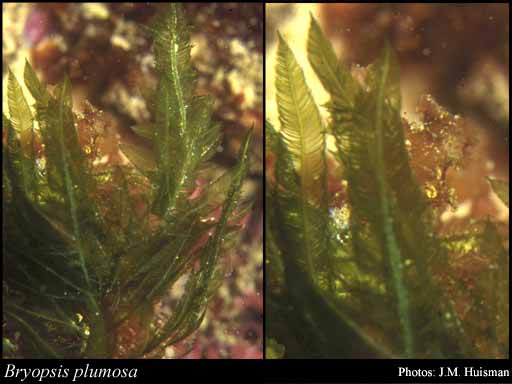- Reference
- Spec.Alg. 448 (1823)
- Conservation Code
- Not threatened
- Naturalised Status
- Native to Western Australia
- Name Status
- Current

Scientific Description
Habit and structure. Thallus broadly spreading, 2–15(–25) cm high, with several to numerous axes arising from a branched, rhizoidal, basal system, usually epilithic. Axes essentially distichously branched, less so below, with lower laterals elongating progressively towards the base and often themselves becoming pinnate, usually naked below (scars inconspicuous or slight). Axes 300–1000 µm in diameter below, laterals 200–400 µm in diameter, and ramuli (1–)2–5 mm long and (70–)90–130 µm in diameter, tapering only slightly.
Reproduction. Thalli dioecious, anisogamous; sporophytes only known in culture, protonemal and uninucleate, producing stephanokontic zoospores which produce the normal gametophyte plant.
Distribution. Widespread in temperate waters throughout the world. Common in sheltered to moderate water movement localities all along southern Australia.
[After Womersley, Mar. Benthic Fl. Southern Australia I: 282 (1984)]
Distribution
- IBRA Regions
- Swan Coastal Plain.
- IBRA Subregions
- Perth.
- IMCRA Regions
- Central West Coast, Leeuwin-Naturaliste, WA South Coast.
- Local Government Areas (LGAs)
- Cockburn, Cottesloe, Esperance, Fremantle, Mosman Park, Perth, Rockingham.